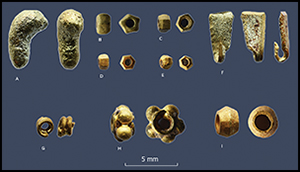Crossref Citations
This article has been cited by the following publications. This list is generated based on data provided by
Crossref.
Pryce, Thomas Oliver
2014.
Encyclopaedia of the History of Science, Technology, and Medicine in Non-Western Cultures.
p.
1.
Wood, Rachel
Duval, Mathieu
Mai Huong, Nguyen Thi
Tuan, Nguyen Anh
Bacon, Anne-Marie
Demeter, Fabrice
Duringer, Philippe
Oxenham, Marc
and
Piper, Philip
2016.
The effect of grain size on carbonate contaminant removal from tooth enamel: Towards an improved pretreatment for radiocarbon dating.
Quaternary Geochronology,
Vol. 36,
Issue. ,
p.
174.
Fenner, Jack N.
Gagan, Michael K.
Cowley, Joan
Armstrong, Richard
and
Prasetyo, Bagyo
2016.
Investigating the presence of foreigners and pig husbandry in ancient Bali: Stable isotopes in human and domestic animal tooth enamel.
Journal of Archaeological Science: Reports,
Vol. 10,
Issue. ,
p.
272.
Hung, Hsiao-chun
and
Chao, Chin-yung
2016.
Taiwan's Early Metal Age and Southeast Asian trading systems.
Antiquity,
Vol. 90,
Issue. 354,
p.
1537.
Mörseburg, Alexander
Pagani, Luca
Ricaut, Francois-Xavier
Yngvadottir, Bryndis
Harney, Eadaoin
Castillo, Cristina
Hoogervorst, Tom
Antao, Tiago
Kusuma, Pradiptajati
Brucato, Nicolas
Cardona, Alexia
Pierron, Denis
Letellier, Thierry
Wee, Joseph
Abdullah, Syafiq
Metspalu, Mait
and
Kivisild, Toomas
2016.
Multi-layered population structure in Island Southeast Asians.
European Journal of Human Genetics,
Vol. 24,
Issue. 11,
p.
1605.
Crowther, Alison
Lucas, Leilani
Helm, Richard
Horton, Mark
Shipton, Ceri
Wright, Henry T.
Walshaw, Sarah
Pawlowicz, Matthew
Radimilahy, Chantal
Douka, Katerina
Picornell-Gelabert, Llorenç
Fuller, Dorian Q.
and
Boivin, Nicole L.
2016.
Ancient crops provide first archaeological signature of the westward Austronesian expansion.
Proceedings of the National Academy of Sciences,
Vol. 113,
Issue. 24,
p.
6635.
2017.
First Islanders.
p.
267.
Ueda, Kaoru
Miksic, John N.
Wibisono, Sonny C.
Harkantiningsih, Naniek
Goh, Geok Yian
Edwards McKinnon, Edmund
and
Shah, Alam Mohd Zaini
2017.
Trade and consumption of fine paste ware in Southeast Asia: Petrographic and portable X-ray fluorescence analyses of ninth- to fourteenth-century earthenware.
Archaeological Research in Asia,
Vol. 11,
Issue. ,
p.
58.
2017.
First Islanders.
p.
312.
Pryce, Thomas Oliver
and
Bellina, Bérénice
2018.
High-tin bronze bowls and copper drums: Non-ferrous archaeometallurgical evidence for Khao Sek's involvement and role in regional exchange systems.
Archaeological Research in Asia,
Vol. 13,
Issue. ,
p.
50.
Ono, Rintaro
Oktaviana, Adhi Agus
Ririmasse, Marlon
Takenaka, Masami
Katagiri, Chiaki
and
Yoneda, Minoru
2018.
Early Metal Age interactions in Island Southeast Asia and Oceania: jar burials from Aru Manara, northern Moluccas.
Antiquity,
Vol. 92,
Issue. 364,
p.
1023.
Pryce, T. O.
Calo, A.
Prasetyo, B.
Bellwood, P.
and
O’Connor, S.
2018.
Copper‐base Metallurgy in Metal‐Age Bali: Evidence from Gilimanuk, Manikliyu, Pacung, Pangkung Paruk and Sembiran.
Archaeometry,
Vol. 60,
Issue. 6,
p.
1271.
Ono, Rintaro
Aziz, Fadilah
Oktaviana, Adhi Agus
Prastiningtyas, Dyah
Ririmasse, Marlon
Iriyanto, Nurachman
Zesse, Irwansyah
Hisa, Yoichiro
and
Yoneda, Minoru
2018.
Development of Regional Maritime Networks during the Early Metal Age in Northern Maluku Islands: A View from Excavated Glass Ornaments and Pottery Variation.
The Journal of Island and Coastal Archaeology,
Vol. 13,
Issue. 1,
p.
90.
Fenner, Jack N.
Jones, Rebecca K.
Piper, Philip J.
Llewellin, Madison
Gagan, Michael K.
Prasetyo, Bagyo
and
Calo, Ambra
2018.
Early Goats in Bali, Indonesia: Stable Isotope Analyses of Diet and Movement.
The Journal of Island and Coastal Archaeology,
Vol. 13,
Issue. 4,
p.
563.
Stark, Miriam T.
2018.
Encyclopedia of Global Archaeology.
p.
1.
Bellina, B.
2018.
Development of maritime Trade Polities and diffusion of the “South China Sea Sphere of Interaction pan-regional culture”: The Khao Sek excavations and industries' studies contribution.
Archaeological Research in Asia,
Vol. 13,
Issue. ,
p.
1.
Castillo, Cristina Cobo
Polkinghorne, Martin
Vincent, Brice
Suy, Tan Boun
and
Fuller, Dorian Q
2018.
Life goes on: Archaeobotanical investigations of diet and ritual at Angkor Thom, Cambodia (14th–15th centuries CE).
The Holocene,
Vol. 28,
Issue. 6,
p.
930.
Tjoa-Bonatz, Mai Lin
and
Lockhoff, Nicole
2019.
JAVA : ARTS AND REPRESENTATIONS. Art historical and Archaeometric Analyses of Ancient Jewellery (7–16th C.) : The Prillwitz Collection of Javanese Gold.
Archipel,
Vol. 97,
Issue. ,
p.
19.
Bellwood, Peter
2019.
The Spice Islands in Prehistory: Archaeology in the Northern Moluccas, Indonesia.
Calo, Ambra
Bellwood, Peter
Lankton, James
Reinecke, Andreas
Bawono, Rochtri Agung
and
Prasetyo, Bagyo
2020.
Trans-Asiatic exchange of glass, gold and bronze: analysis of finds from the late prehistoric Pangkung Paruk site, Bali.
Antiquity,
Vol. 94,
Issue. 373,
p.
110.
